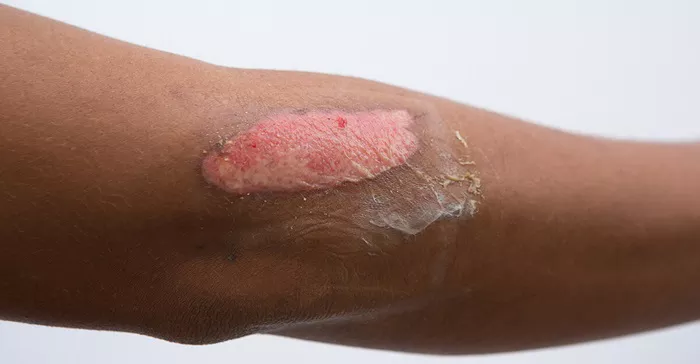Burn scars, with their lasting physical and emotional impact, can be challenging to manage. From traditional remedies to modern treatments, many options are available to aid in scar healing and reduction. One such option that has gained popularity is vitamin E oil. In this article, we delve into the science behind burn scars and explore the potential benefits of using vitamin E oil as a treatment option.
Understanding Burn Scars
Before delving into treatment options, it’s essential to understand the nature of burn scars and their impact on the skin. Burn scars result from damage to the skin’s tissue caused by exposure to heat, chemicals, electricity, or radiation. Depending on the severity of the burn, scars can range from superficial to deep and may cause varying degrees of pain, discomfort, and aesthetic concerns.
Types of Burn Scars
Hypertrophic Scars: These scars are raised, red, and often itchy, forming as a result of an overproduction of collagen during the healing process.
Keloid Scars: Similar to hypertrophic scars, keloid scars are raised and may extend beyond the boundaries of the original injury site, resulting from an overgrowth of scar tissue.
Contracture Scars: These scars occur when the skin tightens and contracts during the healing process, leading to limited mobility and range of motion.
The Role of Vitamin E Oil in Scar Healing
Vitamin E, a fat-soluble antioxidant, has long been touted for its potential benefits in skin health and wound healing. Vitamin E oil, derived from natural sources such as almonds or wheat germ, is rich in tocopherols, compounds known for their antioxidant properties. While research on the efficacy of vitamin E oil for scar healing is ongoing, several mechanisms may contribute to its potential benefits:
Antioxidant Properties
Vitamin E oil’s antioxidant properties help neutralize free radicals, unstable molecules that can damage cells and contribute to inflammation and tissue damage. By reducing oxidative stress, vitamin E oil may help promote a more favorable environment for scar healing.
Moisturizing Effect
Vitamin E oil is known for its moisturizing properties, helping to hydrate and nourish the skin. Proper hydration is essential for scar healing, as it helps maintain skin elasticity and promotes the formation of healthy new tissue.
Anti-inflammatory Effects
Inflammation is a natural part of the healing process, but excessive or prolonged inflammation can impede wound healing and contribute to scar formation. Vitamin E oil may help reduce inflammation, potentially minimizing scar tissue formation and promoting more favorable healing outcomes.
Collagen Production
Collagen is a key structural protein in the skin, playing a crucial role in wound healing and scar formation. Vitamin E oil may stimulate collagen production, helping to rebuild and strengthen damaged skin tissue.
Research on Vitamin E Oil for Burn Scars
While anecdotal evidence and historical use suggest that vitamin E oil may be beneficial for scar healing, scientific research on its efficacy for burn scars is limited and mixed. Some studies have shown positive results, while others have found little to no benefit. Here’s an overview of key research findings:
Positive Studies
A study published in the Journal of Dermatological Surgery found that topically applied vitamin E oil improved the appearance of scars in a majority of participants.
Another study published in the Journal of Burn Care & Research reported that a combination of silicone gel and vitamin E oil was effective in reducing hypertrophic scars in burn patients.
Neutral or Negative Studies
A review published in the British Journal of Dermatology concluded that evidence on the effectiveness of vitamin E oil for scar healing is inconclusive, with some studies showing no benefit or even potential harm.
A study published in the Journal of the American Academy of Dermatology found that topical vitamin E did not significantly improve the cosmetic appearance of surgical scars compared to placebo.
Factors to Consider
When considering the use of vitamin E oil for burn scars, several factors should be taken into account:
Severity of the Burn
The severity of the burn and the extent of scarring will influence the effectiveness of treatment options. While vitamin E oil may be beneficial for mild to moderate burn scars, more severe cases may require additional interventions such as laser therapy or surgical revision.
Skin Sensitivity
Some individuals may experience skin irritation or allergic reactions when using vitamin E oil topically. It’s essential to perform a patch test before applying vitamin E oil to a larger area of the skin and to discontinue use if any adverse reactions occur.
Timing of Treatment
Early intervention is key to optimizing scar healing outcomes. Vitamin E oil may be most effective when applied during the early stages of scar formation, but it may have limited benefit for older or established scars.
Individual Response
Responses to vitamin E oil treatment may vary from person to person. While some individuals may experience significant improvement in scar appearance, others may see minimal or no change. It’s essential to manage expectations and consult with a healthcare professional for personalized guidance.
Tips for Using Vitamin E Oil for Burn Scars
If you’re considering using vitamin E oil as part of your scar treatment regimen, here are some tips to keep in mind:
Choose a High-Quality Product
Opt for a high-quality vitamin E oil derived from natural sources without added fragrances or preservatives. Look for products that are free of potential allergens and irritants to minimize the risk of adverse reactions.
Perform a Patch Test
Before applying vitamin E oil to the entire scar area, perform a patch test on a small, inconspicuous area of the skin to check for sensitivity or allergic reactions. Wait 24 to 48 hours and monitor for any signs of irritation before proceeding with regular use.
Apply Gently and Regularly
Apply vitamin E oil to clean, dry skin using gentle massage motions to promote absorption. For best results, apply the oil consistently, ideally two to three times per day, and continue treatment for several weeks to months.
Combine with Other Treatments
Consider combining vitamin E oil with other scar treatment modalities, such as silicone gel sheets, topical corticosteroids, or laser therapy, for enhanced efficacy. Consult with a dermatologist or burn specialist to develop a comprehensive treatment plan tailored to your individual needs.
Conclusion
Vitamin E oil holds promise as a potential treatment option for burn scars, thanks to its antioxidant, moisturizing, and anti-inflammatory properties. While research on its efficacy is ongoing and mixed, many individuals have reported positive outcomes with its use. When considering the use of vitamin E oil for burn scars, it’s essential to consider factors such as the severity of the burn, skin sensitivity, timing of treatment, and individual response. By following best practices for application and consulting with a healthcare professional, individuals can make informed decisions about incorporating vitamin E oil into their scar treatment regimen, potentially aiding in scar healing and improving overall skin health.
[inline_related_posts title=”You Might Be Interested In” title_align=”left” style=”list” number=”6″ align=”none” ids=”8760,8684,8605″ by=”categories” orderby=”rand” order=”DESC” hide_thumb=”no” thumb_right=”no” views=”no” date=”yes” grid_columns=”2″ post_type=”” tax=””]
































